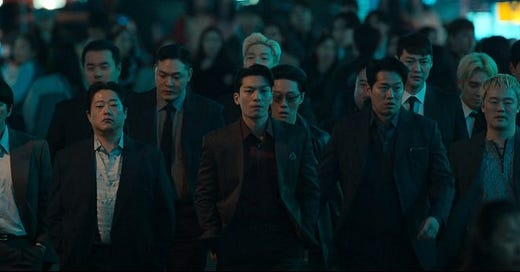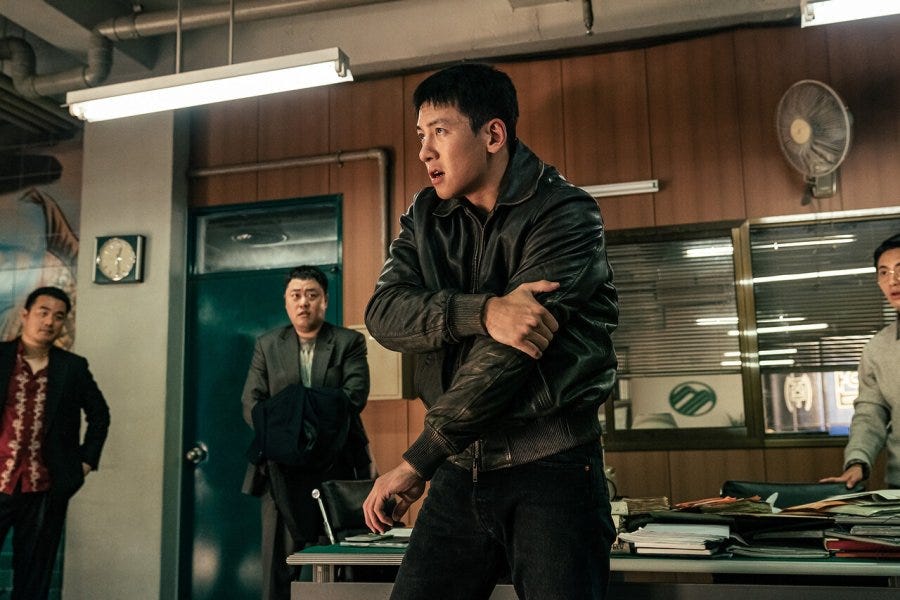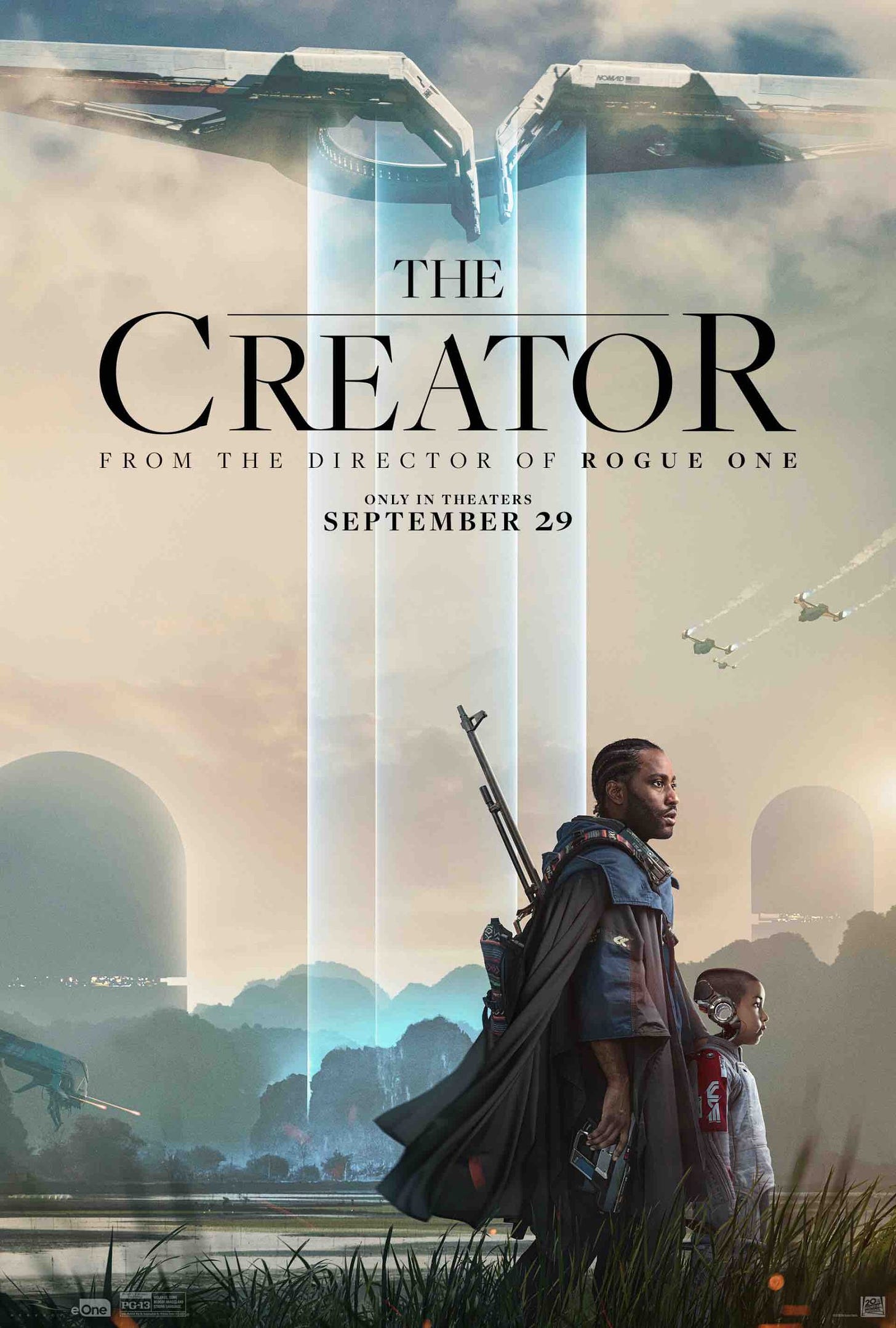The Worst of Evil (2023) First Impressions; The Creator (2023) A Review
Ji Chang-wook returns to crime action in this historical thriller about the South Korean underworld in the late 1990s. He is Park Jun-mo, a low-ranking detective co-opted by his superiors to infiltrate an up and coming Gangnam gang operating nightclubs openly and dealing in methamphetamines in secret. He is married to Yu Eui-jeong (Im Se-mi) a fellow police officer who at the start of the show is already an inspector transferring to the security division. As a result Jun-mo is routinely made to feel his place by his snobbish in-laws who are all elite officers themselves. When first approached by the prosecutor-in-charge and his senior, Jun-mo hesitates. But with the prospect of promotion (and respectability) waved under his nose, he eventually succumbs and agrees.
Jun-mo’s main foil is Jung Gi-cheul (Wi Ha-joon) the founder and head of the Gangnam Union. Formerly a popular nightclub disc jockey who grew up in the area, the savvy and ambitious Gi-cheul takes up the offer by a mob boss to head up his own nightclub. His inner circle consists of a group of friends from high school and their loyalty to him seems unwavering. Not content to be earning chump change, he wants to expand his operations to drug distribution but is flatly rejected by his backer, a notorious figure known as Sgt Jang. Like Jun-mo, Gi-cheul craves respect which he thinks money will bring. He is tired of being trampled underfoot by rich junkies and his direct supervisor so he devises a coup then buys over the biggest mob boss in the country based in Busan.
The first three episodes which is set-up for worldbuilding, characterizations and relationship dynamics are focused on Jun-mo’s attempts to gain access to Gi-cheul and his gang. It is immediately striking that both men are similar in most ways and what’s even more telling is that they are both connected not just by crime but by Jun-mo’s wife, Eui-jeong who was Gi-cheul’s highschool sweetheart. They were fellow choir members at church and their families were friendly. She gifted him a necklace with a cross pendant which he still wears. While we’re not privy to everything so far, something untoward happened to Gi-cheul’s family which most likely threw him off the straight and narrow.
I came to the first episode with the assumption that this seemingly misplaced love triangle in a gangster drama was just that. But having now seen not just one but three episodes I’m convinced that her role in the narrative is far more important than just a shoe-horned obligatory romance for marketing purposes. As his wife, Eui-jeong is positioned to be Jun-mo’s lifeline out of the darkness that he will gradually descend into just so he is able to fit in with the Gangnam Union. At the end of Episode 3 he is presented with the ultimate test of loyalty because the best laid plans can unravel. Moreover Gi-cheul is consistently vigilant about the new recruit especially when he spots far too many coincidences than he’s comfortable with. In this vein, I’m inclined to think that the show is setting up some kind of redemption story for Gi-cheul via Eui-jeong. It’s clear that the script is at pains to shy away from depicting him as some kind of caricature of a villain. Therefore my sense is that she is there in part to add that extra layer to his character arc.
It’s a unique approach to the oft told gangster narrative that criminals are more often made rather than born. As expected both of our male leads are putting in nuanced performances in the role of protagonist and antagonist. It is a testament to Wi Ha-joon’s charisma and the writing of Jung Gi-cheul that I’m having a tough time knowing who to root for. At this point in the story, I must admit that Gi-cheul is the more fascinating character of the two mainly because he’s less of a trope than Jun-mo. He’s certainly not your usual kingpin of organized crime. Though relatively young in the role, he’s calm, meticulous and astute. It’s not hard to see why he commands the respect of his peers. He’s certainly capable of violence but is satisfied to be primarily the brains of the operation directing the troops. Jun-mo is the typical maverick cop who doesn’t fit comfortably with his colleagues and the organization’s structure. Indeed I think the point (not subtly made) is that he is a much better fit with the hurly burly of organized crime — street smart, a propensity towards violence, a tad reckless — than he is with the police.
Despite all the violent blood-letting that’s on display, my feeling is that this will end up being more a character study of two men with similar backgrounds who end up on different trajectories. They’ve been dealt a similar hand but made different choices along the way not to be consumed by resentment and their socio-economic challenges. The proposition that Gi-cheul could have ended up with Eui-jeong is not too far-fetched or that Jun-mo could have ended up as a member of a gang is highly probable. People are often the sum of their choices with or without intervention. Perhaps the screenplay here is playing with the first love trope to posit an argument in the nature vs nurture debate.
It’s a decent watch so far. I’m enjoying the cat and mouse game between the police and Jung Gi-cheul. He’s shaping up to be much more of a challenge than they were led to believe. Clearly this undercover business is new to the cops. To think like a criminal, to pre-empt his moves, clean up properly are not easy even for a loose cannon like Jun-mo. Gi-cheul as a whole is more proficient at the game as he demonstrates unerring caution each step of the way as he avoids falling into the long arm of the law.
The Creator is a sci-fi action adventure featuring the likes of John David Washington, Gemma Chan, Ken Watanabe, Allison Janney and newcomer Madeline Voyles. It purports to be an original story revolved around questions of humanity’s relationship with machines and serves as a transparent allegory about American hard power in the Asia Pacific and beyond. I had no particular expectations going into the cinema but came away disappointed with how unoriginal and lacking in sophistication the screenplay turned out to be. It is highly derivative which is not always a problem but the execution (especially in the final act) leaves plenty to be desired. Visually it is a feast for the eyes and I don’t need to add to the chorus of praise that the show has received for its sumptuous vfx despite the relatively small budget.
To sum it up it’s Blade Runner meets The Golden Child with a dash of The Fifth Element and Avatar. (In fact it’s a competition to identify as many man vs machine tropes as possible) In the height of the great AI purge, the protagonist Joshua Taylor is an undercover US military agent sent to New Asia to hunt down what the Nepalese call “Nirmata” — the AI’s elusive creator — and kill him. While living in New Asia, he falls in love with Maya who falls pregnant with his child. One night without any warning the US military launches an land assault on their home and Maya becomes a casualty of this seemingly botched mission. Five years later, the military comes knocking on his door with news that they may have found Nirmata’s lab and a new weapon devised by Nirmata to knock out the US’ anti-AI orbital flagship, Nomad.
My initial and immediate impression was that this was a well-intentioned redemption story that falls apart in the final act riddled with coincidences and conveniences. But on second thought the problems run a lot deeper. There’s a lot of inexplicable silliness all throughout in order to arrive at a desired ending. Characterization is very one dimensional mainly to service a plot built on conveniences. The love story that’s supposed to be epic enough to drive the protagonist to renege on his mission is not that well developed. The physical world building is fine but the oversimplification of geopolitics and religion took me out of the experience more than once. I was tempted to laugh in supposedly serious moments because the story has an idiot’s understanding of AI and humans. Philosophically and metaphysically building an international incident around AI throws up more questions than the show bothers to answer. I too have a hard time connecting with the notion of AI as substitute humans.
I can’t help feeling by the end that this is some kind of transhumanist propaganda. A heavy-handed bid to advocate for a transhumanist utopia. It would certainly go some way in explaining a script that plays fast and loose with logic and plausibility.
If you enjoyed this post, please like, share or leave a comment. Thanks for swinging by.





